Not Treating Your Thyroid is Costing You Big
You might be thinking, “Well, it’s a good thing that I’m treating my thyroid then!”.
But are you?
If you are undergoing treatment for your thyroid but still experiencing the symptoms of low thyroid then whatever you are doing isn’t working.
Unfortunately, the way doctors approach thyroid management often results in persistent symptoms of hypothyroidism even when using thyroid medications.
You’ll know if you fit into this category because you’ll have been told that your lab tests are “perfect” or “normal” yet you still experience symptoms of low thyroid like weight gain, hair loss, constipation, fatigue, sleep issues, and so on.
And this is where not treating your thyroid costs you big.
Many thyroid patients just assume that they will have to live with these symptoms based on what they’ve heard from doctors and other patients.
In fact, if you look at other thyroid patients you will see some scary statistics.
Many thyroid patients continue to suffer from low thyroid symptoms 10 years after their initial diagnosis.
And this is a huge problem.
If you look at hypothyroidism as something you just have to live with and something that’s going to be with you forever then you’re missing the point.
While it is true that hypothyroidism may be with you forever, it doesn’t have to be the case that you need to suffer from low thyroid symptoms forever.
There’s a situation, one that you should be actively trying to obtain, where you have thyroid disease but barely notice it because your medication is optimized and you are feeling great.
This is the state that you should always be trying to achieve.
And not trying to achieve this state is where things get ugly.
Today I want to make the argument that not treating your thyroid may be one of the most expensive things that you can do.
If you think that eating healthy, buying thyroid medication, or purchasing thyroid supplements is expensive, wait until you see just how much money not treating your thyroid costs you.
In the end, it should be obvious to you that you should be spending a lot more time and energy learning about your thyroid so that you can get back to 100%.
Because, unfortunately, you can’t count on your doctor to help get you there.

Let’s jump in…
DOWNLOAD FREE RESOURCES
Foods to Avoid if you Have Thyroid Problems:
I’ve found that these 10 foods cause the most problems for thyroid patients. Learn which foods you should avoid if you have thyroid disease of any type.
The Complete List of Thyroid Lab tests:
The list includes optimal ranges, normal ranges, and the complete list of tests you need to diagnose and manage thyroid disease correctly!
How Much Dealing With Hypothyroidism Will Cost You
First, let me start by saying that the things we are going to be discussing only apply if you aren’t treating your thyroid correctly.
In other words, hypothyroidism doesn’t have to cost you this much money or cause you this many problems and that’s the entire point of this article.
I’m not trying to tell you that your life is miserable and that you must suffer from these consequences.
Instead, I’m trying to help you understand how important it is to take your thyroid and your health into your own hands.
Next, a couple of disclaimers.
The values and figures that we will be discussing are just estimates and may not reflect actual prices that you have to pay for any given condition.
It’s obviously impossible for me to accurately assess the cost that any given problem or medical condition will cost any single person so we are going to use averages instead.
In addition, just because hypothyroidism tends to cause the problems and complications we are about to discuss doesn’t mean it will cause all of them in you.
As a result, even though I will throw out some actual values and numbers, think of the consequences as more qualitative than quantitative.
In other words, how much is it costing you to not be able to do the things that you love?
That sort of thing.
With these in mind, let’s talk about the costs associated with undertreated hypothyroidism.
#1. The Cost of High Cholesterol.
We are starting with high cholesterol because this is something that not many thyroid patients realize is connected to their thyroid.
It is well known, and I’ve discussed it before, that there is a connection between low thyroid function and high cholesterol (1).
The lower your thyroid goes the higher your cholesterol goes.
This means if you are a hypothyroid patient who is being underdosed then you will likely experience high cholesterol.
But here’s the problem.
Most doctors consider high cholesterol and hypothyroidism as two unrelated phenomena.
They will happily treat your thyroid with levothyroxine while also throwing you on a cholesterol-lowering medication (2) like a statin (atorvastatin was the #1 most commonly prescribed medication in 2019).
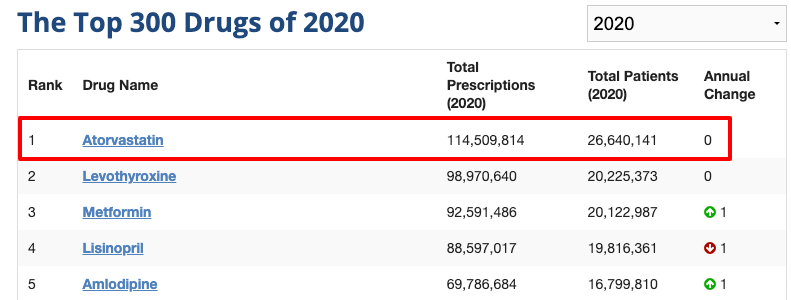
When the better option would just be to increase your dose of thyroid medication which could then help naturally lower your cholesterol level.
High cholesterol is an expensive medical condition because of its link to heart disease (3).
It’s estimated to cost businesses over 200 billion dollars per year due to issues such as lost productivity.
But it also costs patients who have it in the form of stress, lab tests, medications, and doctor visits.
It’s hard to pin down exactly how much high cholesterol costs but here are some estimates:
- The cost of cholesterol-lowering medications may be as high as $2,177 depending on which medications you are taking and your insurance.
- The cost of changing your diet to treat high cholesterol is estimated to be around $1.50 to $2 per day or up to $730 per year.
- The cost of cholesterol-lowering supplements (fish oil, red yeast rice, oat bran, psyllium, etc.) could range be another $75 per month.
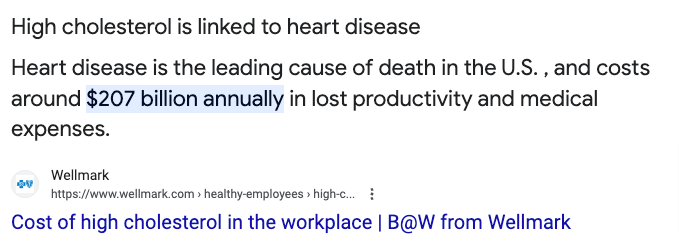
And these values are only for treatment.
They don’t take into account the potential for negative outcomes like a heart attack or heart disease which could dramatically increase these numbers due to doctor visits, hospital stays, and so on.
What’s important to remember here is the connection between your thyroid and high cholesterol (4).
Sure, high cholesterol could be caused by something other than your thyroid but if your thyroid isn’t optimized then you won’t know for sure.
As a result, if you’ve been told that you have high cholesterol then take a good look at your thyroid lab values to see if they are optimized.
If they aren’t, then that’s where you should start.
And, if you are someone reading this who doesn’t have high cholesterol just remember that it tends to come as you age.
So just because you don’t have high cholesterol from your thyroid right now doesn’t mean it won’t come later.
#2. The Cost of Weight Gain.
Next up is probably one of the biggest and that is the symptom of weight gain.
Again, it is well known that weight gain is a primary symptom of low thyroid function.
You can find it in just about any standard physiology or endocrinology textbook out there.
As thyroid function falls, you will gain weight. Period.
Low thyroid function slows down the metabolism and results in weight gain through a number of different mechanisms.
This is why so many hypothyroid patients out there gain weight and have a hard time losing weight.
The problem with weight gain is that it’s easy to blame on other factors.

So even if you are a hypothyroid patient who is being undertreated with thyroid medication, your concerns about your weight can be hand-waved away by your doctor suggesting that it’s all about your diet and how much you exercise.
While your diet and activity level are certainly important for your weight and overall health, they will never be as important as optimizing your thyroid.
Try exercising more and eating less when your metabolism is 20% less than what it should be because your thyroid is undertreated.
It doesn’t work out.
Because of these factors, many hypothyroid patients struggle with obesity.
And how much does obesity cost? Quite a bit.
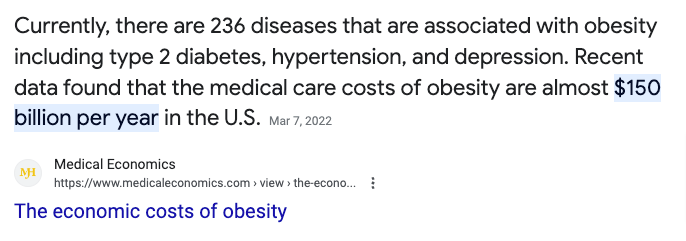
Some estimate that being overweight (with a BMI > 30) costs women up to $4,879 per year and men $2,646 per year.
The numbers get significantly higher when you factor in the value of lost life.
These numbers take into account loss of wages, the price of disability, sick leave, absenteeism, decreased productivity, gasoline use, life insurance premiums, and the value of lost life from premature death.
They don’t take into account things that you might do to try and help with weight loss including things like programs, gym memberships, diets, and so on.
They also don’t include the psychological impact that being overweight has on quality of life.
I won’t get too much into that aspect because if you are struggling with being overweight then all of this is probably well-known to you.
This is exactly why we are discussing it here today.
Instead of focusing on what being overweight will cost you, focus more on how treating your thyroid can help you lose weight.
No, optimizing your thyroid doesn’t result in magical weight loss (though it can for some) for most thyroid patients but it does make losing weight much easier.
As I mentioned previously, imagine trying to lose weight with a 20% reduction in your metabolism.
Now imagine trying to lose weight without that 20% reduction.
It just makes everything easier and more doable.
The key is all about optimizing your thyroid which can be done through the use of thyroid medication, natural therapies, supplements, diet, lifestyle changes, and so on.
#3. The Cost of Fatigue.
Perhaps not as important as some of the others we will discuss today is the symptom of fatigue.
Again, fatigue is one of the primary symptoms of hypothyroidism and is one of the main symptoms that thyroid patients still struggle with despite taking thyroid medication.
Hopefully, you are seeing a trend here.
Many of the problems that thyroid patients face stem from the fact that their thyroid is undertreated and this one is no different.
Fatigue is one of those symptoms that is hard to pinpoint the exact cause.
So even if you bring up this symptom to your doctor you will probably be hit with something like “you are just getting older” or something similar.
While many factors can contribute to fatigue, you simply can’t say it’s not from your thyroid until your thyroid is optimized.
In terms of cost, it’s hard to know how much fatigue costs any single person due to how variable this symptom can be.
It’s estimated that fatigue costs employers up to $130 billion dollars per year.

How this breaks down at an individual level is difficult to figure out but if you factor in lost work days then it may cost as much as $3,000 per year.
#4. The Cost of Hair Loss.
Next up we have hair loss.
Hair loss is another hypothyroid symptom that can occur if the thyroid remains untreated and is a topic that I’ve devoted a lot of time to.
If you’re struggling with hair loss then make sure to check out these resources.
More to the point of this article, let’s talk about how much it will cost you to experience hair loss.
Because hair loss varies from person to person, the amount of money that each person may expect to spend on this symptom will obviously vary as well.
More severe cases of hair loss may require more expensive therapies while less severe cases may be able to be improved with minor treatments like supplements.
As far as therapies go, here are a few with their associated costs:
- Hair transplant – The cost of this expensive procedure ranges from $5,000 to $15,000.
- Hair loss supplements – Usually around $20 to $50 per month.
- Doctor visits, medications, and lab tests – This May cost up to $50 or more per month depending on which type of doctor you see and how many medications you use.
- PRP injections – $500 to $2,000.
- Wigs – Anywhere from $80 to $300 depending on the quality.
- Low-level laser therapy – Usually in the range of $400 to $500.
This isn’t an exhaustive list of all potential hair loss therapies but it does hit some of the major treatments.
These values also don’t take into account the psychological impact that hair loss can have on both men and women.
If you are a patient with hypothyroidism who is also suffering from hair loss then be sure to focus on your thyroid first before jumping into the more expensive options.
It may be the case that treating your thyroid solves most of your hair loss.
#5. The Cost of Depression.
Depression (along with anxiety) can both stem from the thyroid.
The problem with depression is that many other things can also cause it.
It’s hard to know if your depression is caused by your thyroid (5) or by something else unless you treat your thyroid.
Even then, you may find your depression lifts somewhat by treating your thyroid but not all of the way.
Depression, even when treated and managed with medications, still has a cost.
That cost includes the cost of doctor visits, prescription medications, and lost productivity at work.
The hard costs don’t take into account the impact that depression has on quality of life such as experiencing happiness and building meaningful relationships.
It’s hard to put an exact figure on depression but it’s estimated that the economic burden of depression is around $236 billion per year.

It’s hard to know how much of that total cost gets passed down to the individual so I will just leave that value here for now.
What you need to know as a thyroid patient is that depression may be a sign that your thyroid is being undertreated but you will never know until you attempt to optimize your thyroid.
If depression lingers afterward then you know something else is contributing.
#6. The Cost of Decreased Stress Resiliency.
Lastly, we have the cost associated with decreased resiliency to stress.
The thyroid is connected to your adrenal glands which produce cortisol.
And cortisol is the hormone your body produces to help you manage stress.
As thyroid function declines, so too does your ability to tolerate and manage stressful situations due to this connection.
This decrease in stress resiliency can manifest in a number of ways including:
- The symptoms of adrenal fatigue or burnout
- Higher frequency of getting sick (decreased immune function)
- Inability to workout consistently
- Imbalance in other hormones and systems in the body
- Changes to your appetite and food cravings
It’s hard to put a definitive cost on any one of these things but we do know that they most certainly cost something.
How Much Does it Cost to Optimize Your Thyroid?
Now that you understand how much it costs you to not treat your thyroid appropriately, let’s discuss how much it costs to do what it takes to feel better.
Optimizing your thyroid definitely takes a lot of time and money but what you need to understand is the concept of opportunity cost.
Opportunity cost is a way to describe how much you stand to lose by not doing something.
So in the case of not treating your thyroid, the opportunity cost is huge.
We just discussed many of those costs above.
Many thyroid patients probably understand this to some degree but I don’t think they truly understand or they would do everything in their power to get their thyroid back on track.
So how much does it actually take to optimize thyroid function and how does that compare to the costs above?
Optimizing your thyroid may take any or all of the following:
- Finding a competent thyroid doctor – This is probably one of the more difficult parts of optimizing your thyroid and can definitely be expensive. Many thyroid patients assume that seeing their primary care provider or endocrinologist is the best option but that’s typically not the case. Unfortunately, the best doctors to see for thyroid management typically do not accept insurance which means they are more expensive than traditional options. Seeing the right doctor may cost as much as $300 per hour or up to several thousand dollars per year. If you can get away with a doctor that accepts insurance and who also listens to you then great! But don’t waste more than a few months on a doctor that isn’t willing to listen to you, change your thyroid medications, or entertain natural therapies to help you get back to 100%.
- The use of thyroid medications that may not be covered by insurance – Many thyroid patients will need to use combination T4 and T3 thyroid medications to optimize their thyroid. Most thyroid patients are taking levothyroxine because it’s cheap and often covered by insurance but what good is that if it doesn’t help you feel better? Thyroid medications that are likely to help you feel better are often not covered by insurance which means you may have to pay more out of pocket. These medications go by various names and include Natural Desiccated Thyroid formulations, Cytomel, liothyronine, Armour Thyroid, Tirosint, Tirosint-Sol, SR T3, and compounded thyroid medications. Thyroid medication may be required to help you get back to 100% and can cost as much as $200 per month on the high end.
- The use of bio-identical hormones and other non-thyroid prescription medications – Because hypothyroidism impacts other hormone systems in your body you may also need to take other prescription hormones like estrogen, progesterone, and/or testosterone. These come in gels, creams, and injections and may require a prescription from your doctor. The cost for these hormones ranges from $50 per month all the way up to $100 per month depending on your dose and how they are taken.
- Ordering comprehensive lab tests including the complete thyroid lab panel and other hormone panels – One of the reasons thyroid patients fail to get better is because they only ever get their TSH and T4 tested. The complete thyroid lab test panel is necessary to get a more complete picture of thyroid function to help you figure out which thyroid medication is best. Most of the time, the thyroid lab panel is covered by insurance so it shouldn’t cost you much but in the off chance that insurance doesn’t cover it then you may need to spend up to $300 out of pocket each time you get it tested.
- Taking thyroid support supplements – I’m a huge fan of thyroid support supplements and recommend them to all thyroid patients. Thyroid support supplements help your thyroid medication work more effectively and provide your thyroid with other nutrients to help it perform its functions. The cost of thyroid support supplements can vary but may cost anywhere from $100 to $200 per month.
- Changing your diet to healthy whole foods – Don’t expect to feel better unless you learn how to eat healthily. For most thyroid patients this means starting with some type of whole-food based diet. Eating healthy doesn’t have to be expensive but you can expect to add about $1.50 per day to your current grocery bill. That means an extra $550 per year on top of what you are already spending per person (if you are going to eat healthily then just include your whole family).
- Regular exercise and costs associated with that – The costs associated with exercise don’t have to be expensive but they can be depending on what type of exercise you like. If you are someone that likes to do group classes or prefers to work under a trainer then it will be more expensive for you compared to someone that does bodyweight exercises at home while following free youtube videos. You don’t have to get super fancy with your workouts, just make sure that you do them consistently. If you need to spend more for accountability to keep you on track then that may make sense for you. Getting meaningful exercise can be practically free (with home workouts) or be as expensive as $200 or more per month. Do what works for you.
- Spending time and money to reduce exposure to endocrine disruptors – Detoxification is important for proper thyroid function and is something that every thyroid patient should be aware of. You don’t have to go crazy with detox but simple things like drinking filtered water, eating organic foods, getting an air purifier, sweating several times per week, exercising for lymphatic drainage, and ensuring that you have at least one bowel movement per day can make a huge difference. This section can get expensive but there are always cheaper alternatives to get started with. For instance, you don’t need to go out and buy a $2,000 FAR IR sauna in order to sweat (but you can if you’d like) or put a reverse osmosis water system in your house. You can start with a sauna at a local gym or by purchasing pre-filtered water both of which are significantly less expensive than the alternatives mentioned previously. My recommendation here is to start with the cheap options and spend more as you can.
- Improving the quality of your sleep – If you aren’t sleeping 8 hours per night then you will need to spend some time and money in order to improve your sleep. This may mean you need to purchase a new bed, a better pillow, change up the shades or blinds in your room, purchase blue light-blocking glasses, spend more money on energy to keep your room cooler, or even buy products designed to cool off your bed. How much you need to invest in your sleep will depend on the person and can vary in price from a few hundred dollars to a few thousand dollars. No matter what, though, don’t underestimate how important sleep is for your thyroid and overall health! Don’t neglect this step.
- Managing your stress – Another very important aspect of managing your thyroid is managing your stress. The treatments used to manage stress don’t have to be expensive, but they do require time. There are a lot of follow-along meditations that you can find for free on youtube and, sometimes, managing your stress can be as easy as going for a walk at the end of the day in nature. More expensive therapies for managing stress may include things like changing up your job, altering your behavior, or removing toxic relationships from your life. It’s hard to put a precise price on these things so I will avoid giving estimates, but just know that managing your stress is just as important as the other treatments listed here.
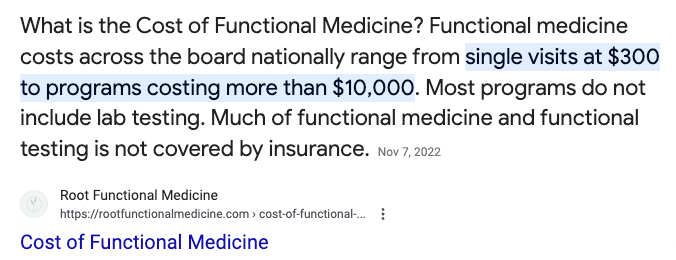
Final Thoughts
Is optimizing your thyroid cheap? Not exactly, but when you compare the cost of not treating your thyroid to the cost of treating it, the numbers make a lot of sense.
You will definitely save more money, live a better life, and avoid a lot of stress by spending time and energy on your thyroid right now.
What about those people who have had thyroid problems for years and years or even decades? Is it too late for them?
It’s never too late to see improvement.
It definitely is more difficult and will require more time and energy to optimize your thyroid the longer you’ve had a thyroid problem but it’s always worth the effort.
Now I want to hear from you:
Do you feel that your thyroid is optimized?
Are you suffering from any lingering symptoms of hypothyroidism despite being treated by your doctor?
Do you feel your thyroid is costing you big either in terms of money or its psychological impact on your well-being?
Were you aware of just how much not optimizing your thyroid could cost you?
Leave your questions or comments below!
Scientific References
#1. ncbi.nlm.nih.gov/pmc/articles/PMC5831065/
#2. ncbi.nlm.nih.gov/books/NBK459188/
#3. ahajournals.org/doi/pdf/10.1161/01.CIR.85.5.1960
#4. ncbi.nlm.nih.gov/pmc/articles/PMC3109527/
#5. ncbi.nlm.nih.gov/pmc/articles/PMC6753820/
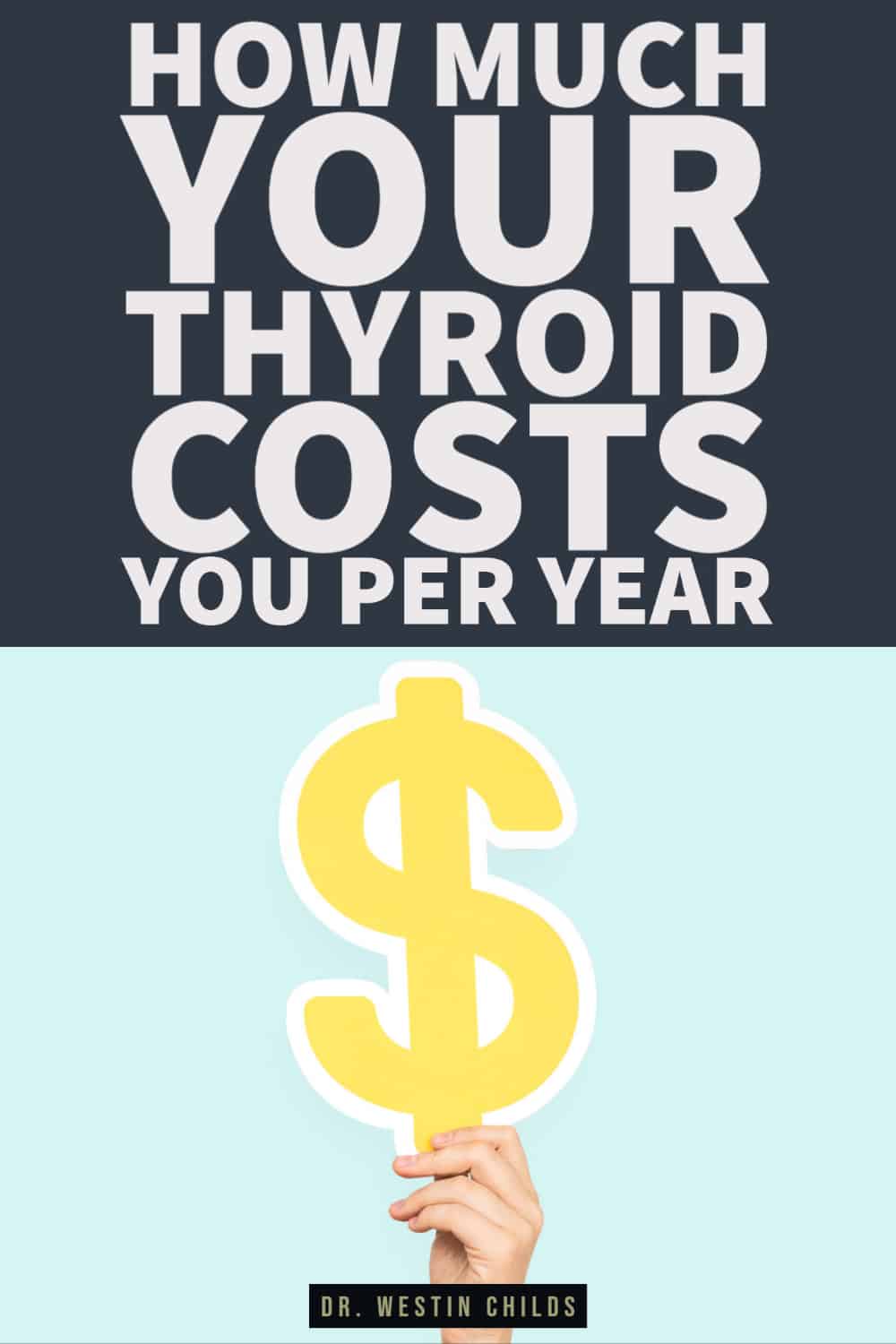
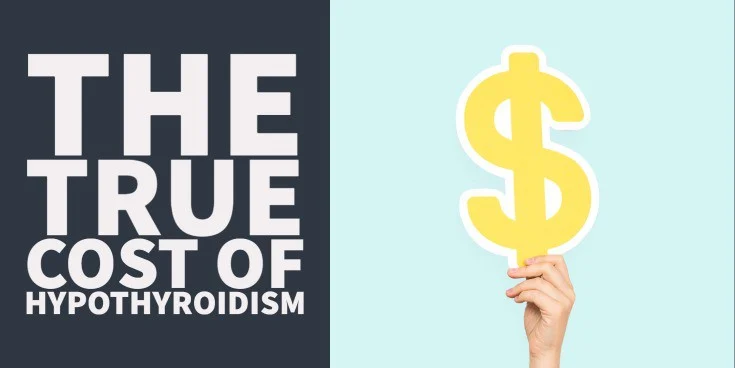







I am 53 post menopausal, been on Levothyroxine for 13 years 100mcg. Last year TSH 7.5, last week 16.9! T4 and T3 in normal range but cholesterol sky high. Would combination T4/T3 help bring down cholesterol? Also noted kidney function only 50%… Symptoms still weight gain, brain fog, muscle cramps…
Hi Linda,
Any (and all) thyroid medications can bring down the TSH, it’s just a matter of dose. If you are TSH remains high then pretty much any increase in thyroid medication dose will bring it down. The goal will be to simultaneously bring down the TSH while increasing free thyroid hormones. Optimizing all thyroid hormones at the same time will help you eliminate your persistent symptoms: https://www.restartmed.com/normal-thyroid-levels/
Hi there,
I was diagnosed with ‘sub clinical hypothyroidism’ 5 years ago, having suffered from symptoms for 10 years before that. I eventually was prescribed 50mcg Levothyroxine which helped for 2 years, until gradual return of symptoms. Increased to 75 mcg, but eventual return of symptoms. I found that eating 6-10 Brazil nuts when I was suffering from extreme muscle weakness, inability to stand and general sickening fatigue, relieved these symptoms enough to allow me to function. I switched to a selenium supplement to allow controlled dosage but it does nothing for me.
When I am weak and shaking and have no choice but to go to work, I rely on Brazil nuts.
My FT3 levels never rose beyond 4pmol/L even on 75mcg Levothyroxine which indicates that I have conversion issues.
I started taking Thybon 20mcg on August 26th 2022.
I am now on 20mcg of pure T3, (I take in the morning) alongside 75 mcg Levothyroxine (I take in the evening)
I had increased my T3 to 25mcg but my latest thyroid panel showed that my blood levels of FT3 had increased to 10.8pmol/L from 4.2pmol/L, pre addition of T3 , (range in Ireland is 3.8-6.8pmol/L)
T4 is 15.4 pmol/L (range 12-22) and TSH is .02mIU/L
I wasn’t feeling great on T3 after one month but one of the most distressing outward symptoms had been cured (a chronic impetigo-like skin infection on my face)
Dr has told me to reduce T3 to 20mcg due to latest thyroid panel results. Unfortunately the skin condition on my face has partially returned.
I have definitely felt improvement in my energy and muscle strength since I separated the doses of T3 and T4 but, I’m tempted to increase T3 by 5mcg to keep the skin issue at bay.
Is a level of 10.8 pmol/L of fT3 going to harm me?
I am not experiencing any hyper symptoms so far even though my TSH is very low.
I hope this makes sense. My life has been completely changed by exhaustion, weakness and skin problems.
Hi Breege,
A higher than normal T3 level has the potential to cause issues but just because it’s high doesn’t guarantee that it will. It’s all a game of chances and probabilities. The higher the T3 and the longer it stays high the more likely it is to cause problems. You’ll need to weigh the benefits of the therapies you are using with the potential downsides of an elevated T3 level and see if it’s worth it in your case. For most people it is, but it’s always worth sitting down and thinking about it in each case.
I’ve been on levothyroxine for 11yrs started meds off at 50mcg now I’m at 175 recently was told I have hashimoto’s antibodies extremely high I read u can gradually take yourself of meds if u can figure out the root cause I’ve struggled with this disease like everyone else meds dont work cause if they did we wouldnt have to keep on taking them I honestly believe it’s due to vitamin deficiency any thoughts will help
Hi Lanette,
If you believe your thyroid dysfunction is related to nutrient deficiencies then I would recommend checking out these articles:
https://www.restartmed.com/thyroid-supplements/
https://www.restartmed.com/nutrient-deficiencies-hypothyroidism/
Can’t optimize a dead thyroid gland. If doctor’s had not been so ill informed in 1986 about the Celiac and thyroiditis connection, all the money I’ve wasted trying to feel just halfway human for the past 40 years could have been saved. I can’t say it enough. If anyone has thyroid issues GET TESTED for CELIAC before doing anything else. My thyroid gland was totally destroyed with RAI. 18 years later, a smart doctor finally diagnosed my Celiac. My gland is dead. No thyroid hormone replacement ever worked for me like Naturethroid. Not NP, not Armour. Synthroid is a joke. Any T3 I take causes my TSH to be suppressed. Even when my FT3 and FT4 are barely at mid-range. No local pharmacies will compound. No local pharmacies will order a certain brand name of levothyroxine so that my hormone replacement isn’t all over the map every month. The true cost of not keeping your thyroid in the best health you can is a wasted life trying to replace what only God can give you. And probably the worst part is the fact that no one cares how much you suffer from hypothyroidism.
Hi Dee,
It is definitely more difficult after thyroid removal but it is still possible to optimize thyroid function. You most likely won’t be able to achieve 100% function compared to a healthy thyroid gland, but you can definitely get up to 90% of that which is pretty good. It will take a very knowledgeable doctor to get there, though, because you are reliant on thyroid medication.
Hi There,
Recently due to some situation, I stopped using Levothyroxine for 40 days. Figured that my
TSH went up from 4.5 to 12.6 ;
Triglycerides: 199 – High; Glucose: 101 – High; Testestorne: 229 Low
Vitamin – D: l3.0 – Low
All other Blood came out to be as normal.
Could you be able to suggest me a better Tip to get back all lab work to normal range?
I started taking low-carb food, Workout – 1 hr a day with 400-500 cal burn.
Started Intermittent fasting ( 10:00 PM to 2:00 pm – window fasting )
Thanks for all your help
Hi Aki,
Yes, please see the recommendations here: https://www.restartmed.com/natural-thyroid-remedies/
Hi Dr child
I started on eltroxin 50 ug about one and half years
Ago after being diagnosed with hypothyroidism.
I don’t complain of many symptoms and was discovered by chance through blood test .
Iam 68 years old malie with a disease called
Alkaptonuria from birth time .
One year ago I had sudden tremor started at jaw then came to neck then shoulder ..knees and lastly feet
.it ended after feet after roughly 5 days .
It comes on and off during the five days. Went to neurologist who did tests and said it may be due to stress. I haven’t had that for 9 month and then came again before 10 days and subsided .
.my question could this be due to eltroxin
And what do u recommend
Thanks and kind regards
Over the course of my life, I’ve lived with a number of nonlife-threatening issues which, for years, have caused me to question the function of my thyroid gland. Some of these issues just make me feel lousy and others, I believe, put a strain on my heart. I would like the advice of someone who can tell me if I am correct in suspecting that I have a thyroid disorder so that I can seek treatment to feel better and prevent my health from further deteriorating. It is very difficult to get a diagnosis for this disorder when one’s TSH number falls within the normal range
I first started thinking that my thyroid was causing me some trouble in the early 1990s. I was having a very difficult time with my monthly period. I would literally hemorrhage for 7 days. My iron was very low and I was afraid to leave home during those days. I started doing some research and I learned that the thyroid has some control over the monthly flow. At the same time, I read about other symptoms of thyroid disorder. Hair loss was one and I had just seen a specialist in Saskatoon regarding my hair loss who diagnosed it as hereditary. I learned that cold body temperature was another symptom and I am frozen most of the time. I learned that constipation was another symptom. I have been taking something for constipation since 1975. I was first given perscription drugs but now rely on Metamucil only which I take twice a day. Well, even though I thought that my thyroid was suspect, I was given a hysterectomy so that I would no longer suffer the effects of my monthly flow.
Since then, the symptoms have continued to add up. I’ve had borderline cholesterol levels since the late 1990s which I control with diet. I’ve had tinnitus in my left ear for more than 20 years. Almost 20 years ago, I started having shortness of breath which has steadily gotten worse over time. For years, too, I’ve found it almost impossible to take a deep breath. About eight years ago, I was diagosed with “mild asthma”. I use three inhalers. I’ve endured coughing and hoarseness from an excess of phlegm for many years. I have been plagued with extreme tiredness for the last 2 – 3 years. When I am feeling my worst, I have found that I feel better if I go for a brisk walk or walk on my elliptical and force myself to breathe deeply. It’s almost as though my breathing has gotten too shallow so that I am not getting enough oxygen. Since November, 2021, I have had swelling and numbness on the left side of my face and neck. Before that, I had two other episodes of pain in the left side of my neck for which I had ultrasound in May, 2021 and Sept, 2020, neither of which revealed a cause. I often suffer from bloat with my stomach puffing up like a balloon. I frequently suffer from lack of sleep. After a few hours of sleep, I wake up to go to the bathroom and cannot go back to sleep. In recent years, I’ve started having very dry skin. I’ve just started experiencing episodes of extreme heart burn. I now take medication for high blood pressure which was diagnosed in February, 2022 and was never before a problem for me. I have also started retaining fluid and am experiencing swelling of my ankles. The latest symptom I am having to deal with is weight gain especially around my abdomen.
I’ve been hoping to find some answers for a long time. In August, 2022, I saw an endocrinologist who did some tests but found nothing to treat. Since I experienced some chest pain in February, 2022, I was referred to a cardiologist and have been through all the tests related to the heart and have found that everything is good. I am now seeing a respirologist who is really just adjusting my inhalers.
Are my symptoms just a result of aging? I have a hard time accepting that and hope I don’t have to live out the rest of my life feeling dragged out all the time.
Hi Dianna,
It’s possible that some of them are related to aging but I still wouldn’t let that stop you from continuing to explore their cause. The worst thing that can happen is that you feel better along the way.